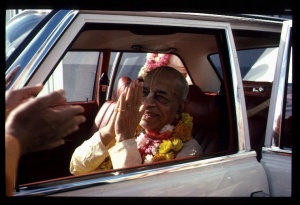SB 1.16.13-15 (1965)

A.C. Bhaktivedanta Swami Prabhupada
TEXTS No.'s 13-15
Tatratatra upasrinwanah swapurvesam mahatmanam Parigiamanam cha yasah krishna mahatma suchakam.
Atmanam cha paritratam aswatthamno astra tejasah Sneham cha Vrishniparthanam tesam bhaktim cha kesav.e
Tebhyah parama samtustah priti ujjrimbhita lochanah Mahadhanani vasansi dadou haran mahamanah.
ENGLISH SYNONYMS
Tatra tatra—everywhere the King visited, Upasrinwanah—continuously he heard, Swapurvesam—about his own forefathers, Mahatmanam—who were all great devotees of the Lord, Parigiamanam—unto those who were thus addressing, Cha—also, Yasah—glories, Krishna—Lord Krishna, Mahatma—glorious acts, Suchakam—indicating, Atmanam—his personal self, Cha—also, Paritratam—delivered, Aswatthamno—of Aswatthama, Astra—weapon, Tejasah—powerful rays, Sneham—affection, Cha—also, Vrishniparthanam—between the descendants of Vrishni and that of Pritha, Tesam—of all of them, Bhaktim—devotion, Cha—also, Kesave—Unto Lord Krishna, Tebhyah—unto them, Parama—extremely, Santustah—pleased, Priti—attraction, Ujjrimbhito—pleasingly open, Iochanah—one who has such eyes, Mahadhanai—valuable riches, Vasanani—clothings, Dadou—gave in charity, Haran—necklace, Mahamanah—one who has broader outlook.
TRANSLATION
Wherever the king visited, continuously he heard about the glories of his great forefathers who were all devotees of the Lord indicating herein about the glorious acts of Lord Krishna also. He also heard about his personal self as to how he was protected by the Lord from the powerful heat of the weapon of Aswatthama. The addressers also mentioned about the great affection between the descendants of Vrishni and that of Pritha on account of the latter's great devotion for the Lord Keshava. The king thus being very much pleased upon the singers of such glories had his eyes open in great satisfaction and he was pleased to award upon the singers very valuable necklaces and clothings by his magnanimous mind.
PURPORT
Kings and the like great personalities of the state are presented with welcome addresses, is a system from time immemorial and Maharaj Parikshit, as he was one of the well known emperors of the world, was also presented with addresses of welcome everywhere in all parts of the world as he visited those places. The subject matter of those welcome addresses was Krishna. Krishna means Krishna and His eternal devotees as much the king means the king and his confidential associates.
Krishna and His unalloyed devotees cannot be separated and therefore glorifying the devotee means glorifying the Lord and vice versa. Maharaj Parikshit would not have been too glad to hear about the glories of his forefathers like Maharaj Yudhisthir and Arjuna etc had it not been so done in connection with the acts of Lord Krishna. The Lord descends specifically for deliverance of His devotees ( paritranaya sadhunam ) and the devotees are glorified by the presence of the Lord because such devotees cannot live for a moment without the presence of the Lord by His different energies. The Lord is present for the devotee by His acts and glories and therefore Maharaj Parikshit felt the presence of the Lord when He was glorified by His acts specially in the matter of his personal self as he was saved by the Lord in the womb of his mother. The devotees of the Lord are never in danger; but in the material world which is full of dangers in every step, the devotees are apparently placed into a dangerous position and thus being saved by the Lord the Lord is glorified. Lord Krishna would not have been glorified as the speaker of the Bhagwat Geeta had His devotees like the Pandavas were not entangled in the battlefield of Kurukshetra. All such acts of the Lord were mentioned in the addresses of welcome and Maharaj Parikshit, in full satisfaction, rewarded those who presented such addresses. The difference between the presentation of welcome addresses in the modern days and that in the days gone by is that formerly the welcome addresses were presented to a person like Maharaj Parikshit; the welcome addresses were full of facts and figures and those who presented such addresses were sufficiently rewarded; whereas in the present days the welcome address is presented not always with factual statements but to please the postholder and sometimes they are full with untruth for flattering the object but alas rarely such presentations of welcome addresses are rewarded by the poor receiver.